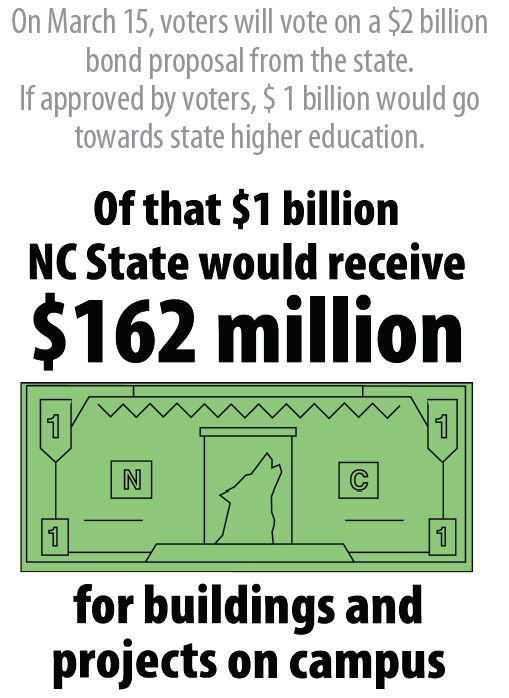On March 15, North Carolinians will head to the polls to vote on a referendum to allow the state to sell $2 billion bonds to fund its ConnectNC project, which, if approved by voters, could bring a chunk of the funds back to NC State.
The bond, which was proposed in August by Gov. Pat McCrory, has a hefty sticker price for the state, but, in addition to paying for other projects statewide, would give nearly $1 billion to the UNC higher education system.
The bond has garnered heavy bipartisan support, even from fiscally conservative state Republicans, like the governor and Speaker of the House Tim Moore. Both McCrory and Moore spoke on behalf of the bond at the campaign kickoff event at NC State in January and stressed heavily that there would be no tax increase on North Carolina citizens for the bond.
The legislature has mainly pedaled the bond for its impact on higher education, as it would provide funds to every UNC System school, including building a new North Carolina School of Science and Math satellite location.
NC State will receive a total of $162 million from that funding for a new civil engineering building on the Engineering Oval on Centennial Campus and a new Plant Sciences Initiative. The funding will allow NC State to build a new Plant Sciences Building on Centennial Campus, providing temporary spaces for plant scientists and businesses.
The Engineering Oval Project, which would receive $75 million from the state, includes constructing a building between Engineering Building I and Hunt Library on Centennial Campus with new research and education facilities for the Department of Civil, Construction and Environmental Engineering and the Department of Industrial and Systems Engineering. The building would also include new space for the college’s administrative offices.
This building would essentially complete the move of engineering from Central to Centennial Campus, excluding only the Department of Nuclear Engineering, which will remain in the Burlington Engineering Laboratories.
The Plant Sciences Project is slotted to receive $85 million from the state. It includes building a space primarily for graduate student and faculty research within the College of Agriculture and Life Sciences. The space would be interdisciplinary, bringing together scientists from all aspects of plant-based agriculture to research and collaborate with agricultural research companies located in the Triangle.
While the money from the state would officially mean the university could begin construction on the new facilities, the referendum is not set to fund these projects in their entirety. The university has already raised 50 percent of the total funding for the Engineering Oval Project from private-sector donations, as well as 30 percent of the total funding for the Plant Sciences Project.
Tom White, an economic developer for Centennial Campus, said NC State is using this bond to “look at what the market is demanding” and expanding its plant science focus for a growing industry.
When asked how the bond would help Centennial continue to attract private companies to NC State White explained, “If you want to be competitive, you have to be current.”
The bond also allocates money to projects on other UNC System schools, including an expansion to the UNC-Greensboro Nursing Program, construction of a new medical education building at UNC-Chapel Hill and a new biotech building at East Carolina University. About $350 million will go to various community colleges, and the rest of the bond money will go to water and sewer infrastructure, agriculture, National Guard facilities and maintenance of parks and zoos.
It is the first time a bond referendum will be included on the ballot since the 2000 election, when a $3.1 billion bond was passed by an overwhelming 73 percent of voters. That bond, with a higher sticker price, was also directed mainly toward North Carolina’s higher education institutions, as well as expansive road repair and maintenance.
Supporters of this year’s ConnectNC bond are worried that voters may not be as enthused about the referendum given its lack of funding for roads.
Nevertheless, since the bond’s conception in October by McCrory, it has garnered overwhelming bipartisan support. Both McCrory and Attorney General Roy Cooper, who is planning to run against McCrory for governor in November, have expressed support for higher education.
Both parties have stressed the fact that the bond will not increase taxes on North Carolinians and will situate the state’s higher education program for continued growth.
Even though there is currently no organized group opposing the bond, lawmakers and advocates are weary of disappointment. According to the News & Observer, there is fear among supporters that if fiscally conservative Republicans show up to vote en masse for the presidential primary, they could be scared off by the sticker price of the bond and vote against it.
Jenna Albert, a freshman studying animal science amd Blair Borsuk, a junior studying agribusiness management, both registered Republicans, said that after researching the bond they would both vote for it. Borsuk, an organizer with Turning Point USA, said she liked the bond because it “doesn’t raise taxes, and it is operated on a state-level.”
“Higher education is something that is really special in North Carolina,” White said on why he thinks the bond will pass, adding that it will allow NC State “to continue to give our students wonderful places to work and study.”








